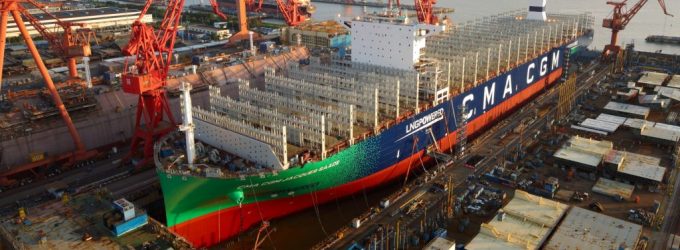Container spot rates have peaked as all major trades see prices fall
There was more evidence in this week’s container port freight markets that peak prices on ...
TFII: SOLID AS USUALMAERSK: WEAKENINGF: FALLING OFF A CLIFFAAPL: 'BOTTLENECK IN MAINLAND CHINA'AAPL: CHINA TRENDSDHL: GROWTH CAPEXR: ANOTHER SOLID DELIVERYMFT: HERE COMES THE FALLDSV: LOOK AT SCHENKER PERFORMANCEUPS: A WAVE OF DOWNGRADES DSV: BARGAIN BINKNX: EARNINGS OUTODFL: RISING AND FALLING AND THEN RISING
TFII: SOLID AS USUALMAERSK: WEAKENINGF: FALLING OFF A CLIFFAAPL: 'BOTTLENECK IN MAINLAND CHINA'AAPL: CHINA TRENDSDHL: GROWTH CAPEXR: ANOTHER SOLID DELIVERYMFT: HERE COMES THE FALLDSV: LOOK AT SCHENKER PERFORMANCEUPS: A WAVE OF DOWNGRADES DSV: BARGAIN BINKNX: EARNINGS OUTODFL: RISING AND FALLING AND THEN RISING

French carrier CMA CGM has announced it is collaborating in plans to build a BioLNG plant in Marseille Port to service the 44 LNG-powered vessels that will be in its fleet by 2024.
A consortium of companies will develop a circular economy project that will use household waste to develop methane rich BioLNG.
They will use a waste processing plant commissioned by the municipality of Aix Marseille-Provence from EveRé, a subsidiary of Spain’s Urbaser Group, itself a subsidiary of China Tianying Inc.
Its French subsidiary, Urbaser Environnement, specialises in the construction and operation of integrated household and urban waste sorting, treatment and recovery facilities.
Joining EveRé and CMA CGM in the project will be Elengy, a subsidiary of Engie, operating LNG terminals at Fos-sur-Mer, and TotalEnergies, a multi-energy company that produces and supplies energy.
The project will “study the feasibility of creating France’s first production unit for liquefied biomethane (BioLNG), a low-carbon alternative fuel dedicated to energy transition in the shipping industry”.
According to CMA CGM, BioLNG will be the renewable energy source that will fuel CMA CGM ships, producing a reduction of greenhouse gas (GHG) emissions of at least a 67%.
The fuel will be produced by “converting the biodegradable part of household waste from the Marseille Provence region [into] BioLNG”.
The company said: “The project forms a circular economic system. Using the area’s household waste will help reduce local air pollutants (nitrogen oxides, sulphur oxides and fine particles), improving air quality and quality of life for people living in the region, and supporting the energy transition in the shipping industry.”
Measuring emissions on from vessels operating on BioLNG “at the vessel level” (from the tank to wake), GHG emissions are reduced by 88%. Furthermore, the use of LNG reduces sulphur oxides by 99%, particulates by 91% and nitrogen oxide by 92%, said CMA CGM.
In its analysis of BioLNG, the International Energy Agency believes its use for difficult to decarbonise industries, such as aviation and deepsea shipping, can reduce emissions.
However, the agency warns: “The environmental case for natural gas in these applications rests on much lower air pollutant emissions, allied to an appreciable reduction in CO2 compared with combustion of oil. The counter-argument points to the risk of fugitive methane emissions along the natural gas supply chain as well as at the vehicle tailpipe.”
Comment on this article